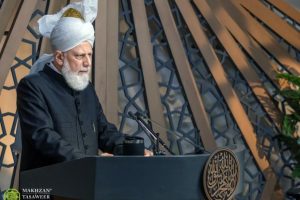
Nusrat Haq, BA (Oxon), is a practising solicitor in Corporate Law who has lived in Melbourne, Australia, for 10 years. Raised in London, Nusrat is of Pakistani heritage and belongs to the Ahmadiyya Muslim Community. She studied law at Oxford University (St. Hilda’s College), the world-renowned institution that has educated 28 of the 55 UK Prime Ministers to date, as well as the current Prime Ministers Boris Johnson and Imran Khan. It’s illustrious alumni also include 50 Nobel Prize winners and 10 Lord Chief Justices. She is now married with 2 children. The Review of Religions’ Editor of the Women’s Section, Munavara Ghauri, interviewed Nusrat to discover how her faith and career have correlated and if she has faced any extra challenges as a practising Muslim woman.
MG: When and how did your interest in Law as a career develop?
NH: After realising that to become a doctor, I’d need a skill in maths that I didn’t (and don’t) possess, I had to find something else that was reasonably worth doing. Thankfully, I came to the realisation about my maths skill very early on but wanting to be a doctor shaped my concept of being a lawyer, at least in part. I wanted to be a lawyer so I could help people. About twenty years later, even as a corporate lawyer, that’s still what I like to do and the kind of work I get excited about. I am now a corporate lawyer for a global organisation in the financial services industry. I enjoy a demanding portfolio which includes advising on regulation, cross border arrangements and new products and services. Still fairly early in my career, I try to focus on areas where I can garner and enhance skills that will be useful once I’ve got to a point in life where I can more actively devote my time to others.
MG: Did you ever feel any family resistance to pursuing a career?
NH: I consider myself fortunate in many respects, and having no opposition to pursuing a career is one of them. There was never a suggestion in my family that I wouldn’t pursue a career (at least that I’m aware of!) For various reasons, becoming a lawyer was something my mother resisted for a long time. She was probably still trying to get over the shock of how poor my maths was compared to hers (she studied maths at degree level!) and presumably was concerned whether I’d be successful as a lawyer, given that I could never win a debate against her (full credit to her skillset!) It was the subject matter she challenged, rather than having a career – the latter was insisted on. Ultimately, I won the debate that mattered the most: what to study and practise.
MG: Are you happy in your current position?
NH: I am happy with this job but I would definitely like to try something new when the kids are a bit older. I don’t think anything more managerial as I genuinely love practising Law (…and the more managerial the less legal things become, sadly.)

MG: As practising Muslim women we keep a distance from non-related men socially. Did you face any challenges to maintain your purdah whilst studying at Oxford University, where the collegiate system encourages a lot of socialising amongst students?
NH: I attended social events at university whilst observing purdah. [1] At the end of the day, purdah doesn’t hold you back from anything in my view. Yes, there are certain things that as a Muslim woman we ought not to do but those rules remain whether or not you outwardly observe purdah and they apply equally to Muslim men (and persons with certain other religious beliefs).
Having started purdah in my early teens, it feels as though purdah has always been a part of my outward image. Perhaps that brings with it a sense of confidence in wearing purdah, but I consider the ease with which I view purdah to be another one of the more fortunate aspects of my life.
Personally, I see purdah as one of the easiest forms of religious compliance. I’m not sure why that is. Maybe it’s just the ease that comes with it. At university, I just put on my niqab and coat and ran out of the door to the library or lectures!
MG: Have you faced any challenges to maintain your purdah in the workplace? For example, whilst attending departmental dinners/team-building events/Christmas parties etc?
NH: No, I haven’t faced any challenges at work or work events due to purdah and I’d echo my comments from your earlier question. There is so much awareness and training given to people at work these days, hiring and senior managers in particular, that I think it’s easier than ever for Muslim women to participate in the workforce and work events. It’s well understood that, ultimately, it’s to the employer’s benefit to ensure an inclusive workplace.

MG: That’s very true Nusrat. Has being an Ahmadi Muslim woman hindered you in any way in terms of your career aspirations?
NH: No, being an Ahmadi woman hasn’t hindered my career aspirations and I don’t think there’s anything inherently in Islam or Ahmadiyyat that does so. As every woman knows, life is about juggling obligations and making the most of one’s time. Yes, we have religious, familial, domestic, and motherly obligations but so do many other women, Muslim or otherwise. For various reasons, some women stay at home but that is not a religious requirement and it certainly isn’t the case that those women don’t work (I can substantiate that given the two years of maternity leave I spent at home). In any event, the expectation of an Ahmadi woman is that she devotes her time to Jama’at and community work if she is not undertaking paid employment; I consider that a noble and fulfilling career if it is what a woman wants to do, and it is a feasible option from a financial perspective.
MG: Indeed, I’d agree with you that women are the masters of multi-tasking! That leads me to my next question. As Muslims, we offer 5 daily prayers and fast during the month of Ramadhan. How have you managed to combine fulfilling these religious obligations with your busy work schedule?
NH: For me, offering prayers is one of the more challenging requirements of Islam, to consistently and meaningfully satisfy. The real struggle for me is that whilst I may be able to pray, I need to be able to devote myself to it. For me, offering prayers is not a box-ticking exercise and I’d feel guilty if it was. So the physical and mental strain of juggling work, kids and home (yes, in that order) can make offering meaningful prayers a challenge. At the end of the day though, there is only one place I can put my head down in a childlike manner and know that help is guaranteed (often in forms I could not foresee or engineer).
MG: I think you raise a really key point, that offering prayer should be about ‘meaningful’ supplications each day and not just a tick-box exercise.
NH: Fasting, on the other hand, is easy for me despite the relatively busy lifestyle – bearing in mind I haven’t had to fast in the summer months as I managed to move from England to Australia just at the right time! Alhamdulillah. I’m not particularly skilled at maintaining routines (excellent at planning a routine, mind you!) Fasting really helps me to reset and sets me up to be my ideal self. And as anyone that knows me will attest, the only person I’m competing with is the person my thirteen-year-old self imagined me to be!
MG: You have a young daughter. What values are you hoping to instil in her?
NH: As a mother, and a bit of a perfectionist, I’d like my daughter to possess every positive value in a way that is balanced relative to the circumstances (that would sound so much better in Urdu and coming from someone eloquent!) If I had to choose, I’d like her to be truthful and at one with God.
MG: That sounds both eloquent and profound Nusrat! The Holy Prophet Muhammad (sa) himself taught that ‘Truth guides to virtue and virtue guides to Paradise.‘ [2] As Ahmadi Muslims, we feel that His Holiness, Hazrat Mirza Masroor Ahmad (aba), is our spiritual head and guide. How much has his Holiness (aba) been influential in your life?
NH: Hopefully, by now, you’re seeing a theme. My being is an amalgamation of many blessings and His Holiness (aba) is a significant blessing. For various reasons, His Holiness (aba) is a father figure to me and remains so despite the geographical distance now between us. I think everyone knows the benefits that father figures can have and many more qualified people have written extensively on the subject. I will say that one of his Holiness’ (aba) great traits is his measured approach to things. That is a trait I haven’t frankly mastered; so often I think of him and pause when I’d really just like to offer my immediate thoughts or reactions.
MG: As an Ahmadi Muslim woman you will be part of the auxiliary ladies’ association – Lajna Imaillah. How significant is this organisation to you?
NH: As the kids grow and I settle in my career, I very much look forward to working actively within Lajna. As an organisation, Lajna has the ability to aid democracy, accountability, and the empowerment of women. It is a visionary, structural mechanism to achieve these and many other great things. I pray that Ahmadi women can do it and its originator (Hazrat Musleh Maud (ra) – the Second Worldwide Head of the Community) justice.
MG: What are your future goals and aspirations?
NH: I am at the beginning of a very long journey, but I am immensely grateful for where I am. Going forward, all I can pray for is the ability to achieve a finessed balance between my various obligations and aspirations. I’d like to be a supportive and present mother, a skilled and helpful lawyer and a reliable friend and relative.
MG: Thank you for sharing your thoughts and experiences, Nusrat. I think many women will share some aspects of your values and aspirations. We wish you the best of luck in the future.
ENDNOTES
[1] The practice of Muslim women to cover their hair and bodies (and possibly faces), with loose-fitting clothes in accordance with Qur’anic teachings (e.g. Ch24-V32).
[2] Muhammad Zafrulla Khan – Gardens of the Righteous, Islam International Publications, 1989, p18.




Assalamo alaikum. It was amusing to notice many similarities between Nusrat and myself. My reason for studyiyúúýng law was also primarily due to my weakness in science, especially math.
And same like her, I’m not good at maintaining routines but do have skill to
And what’s most important for me with regard to my kids is also truthfulness and attachment with Allah.